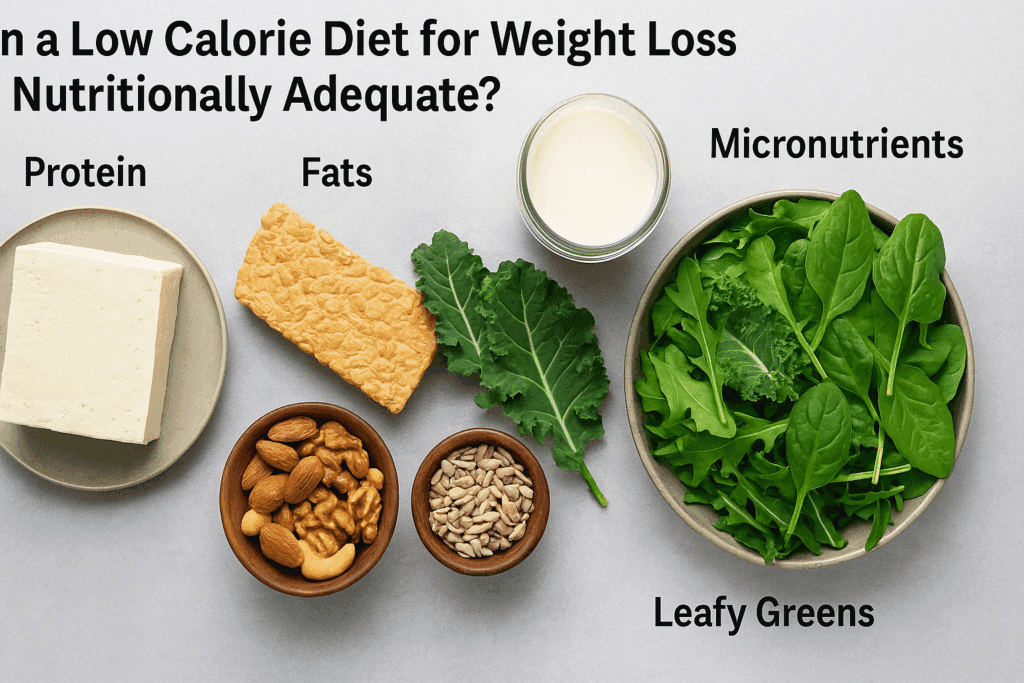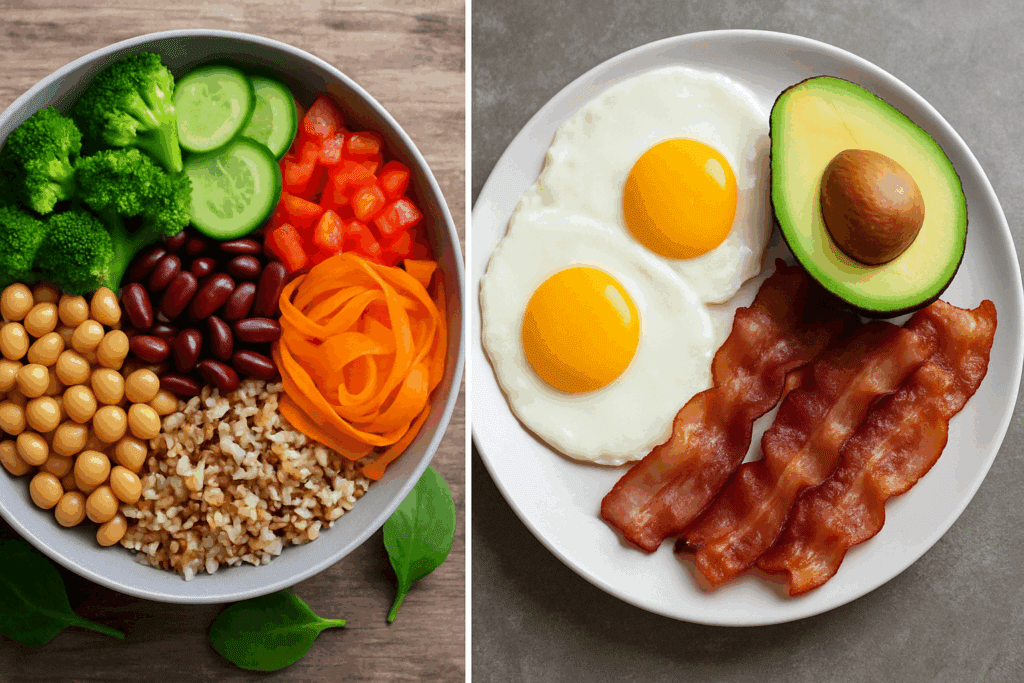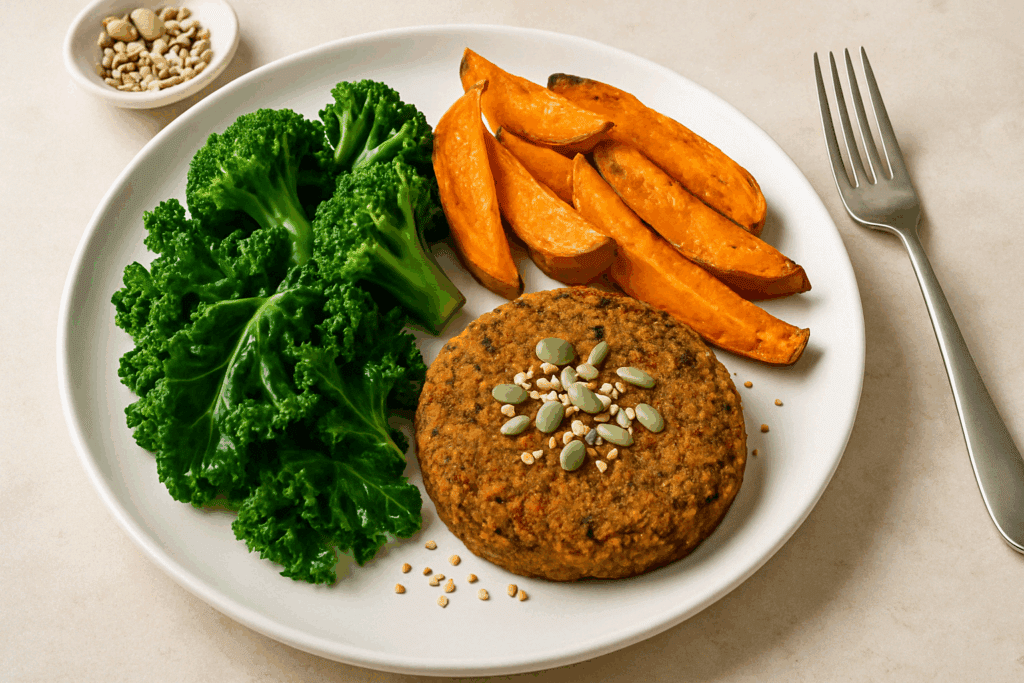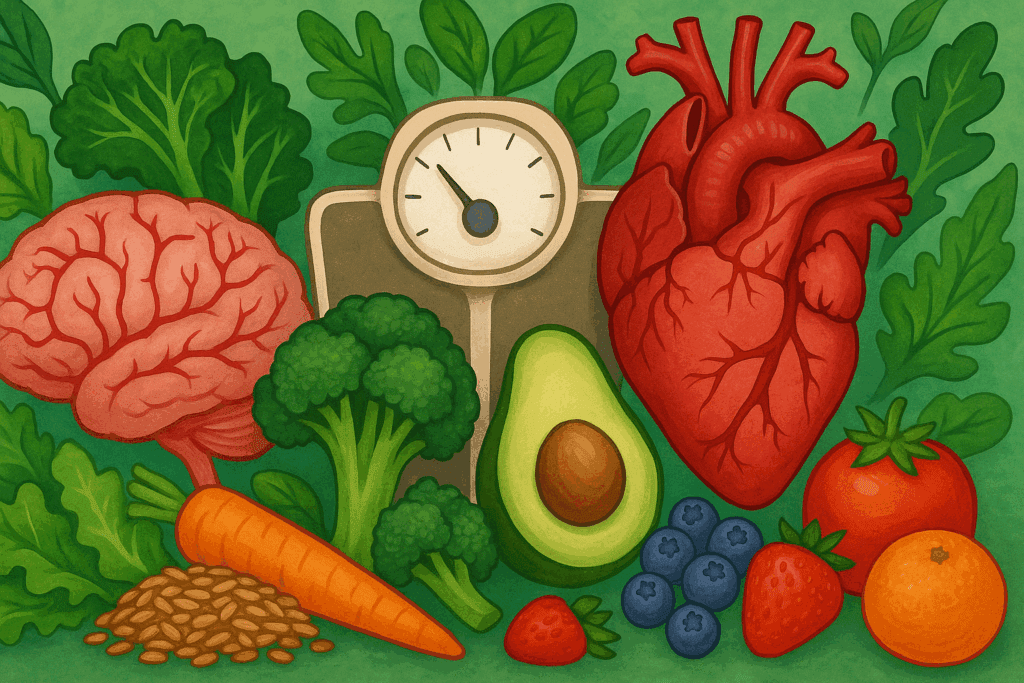For many seeking sustainable weight loss and improved health outcomes, the concept of calorie control is nothing new. But within the broader health and nutrition landscape, a low calorie diet for weight loss—especially when grounded in a whole-food, plant-based framework—has gained renewed attention for its efficacy, safety, and long-term benefits. With growing interest in how caloric reduction affects body composition, metabolic health, and disease prevention, it’s important to unpack the science behind these diets and examine whether fewer calories, paired with nutrient-dense, plant-based choices, can truly promote better health.
You may also like: Plant Based Diet vs Standard American Diet: What the Latest Studies Reveal About Long-Term Health Outcomes
Understanding Caloric Intake and Energy Balance
At the core of any weight loss strategy lies the principle of energy balance: consuming fewer calories than the body expends. This is commonly referred to as a calorie deficit diet plan. While this may sound straightforward, the complexity emerges when trying to create and sustain that deficit without compromising nutritional adequacy, mental well-being, or metabolic function. A calorie deficit can be achieved either by reducing intake, increasing physical activity, or ideally, a combination of both.
For those opting for a reduced calorie diet for weight loss, the emphasis must remain on consuming fewer calories without sacrificing the essential nutrients the body needs to function optimally. This is where whole-food, plant-based diets often shine. They are typically lower in calorie density while being rich in fiber, phytonutrients, vitamins, and minerals—offering a practical way to feel full and nourished even when eating fewer calories.

Low Calorie Diet Calories: What Does That Look Like in Practice?
The term “low calorie diet” is somewhat relative and can vary based on individual factors such as age, sex, metabolic rate, and activity level. Generally, a low calorie diet includes around 1,200 to 1,600 calories per day for women and 1,500 to 1,800 for men. However, the exact figure depends on personalized factors, and it is critical that any plan be supervised by a healthcare provider or registered dietitian when the caloric intake drops below typical thresholds.
A very low calorie diet weight loss approach, which may restrict intake to fewer than 800 calories per day, is usually implemented under strict medical supervision. These plans are often used short-term for individuals with obesity-related comorbidities and may include meal replacements or medically-formulated nutrition shakes. While effective for rapid weight loss, very low calorie diets must be used cautiously to avoid nutrient deficiencies, muscle loss, or gallstone formation.
The Role of a Plant-Based Framework in Caloric Reduction
A plant-based diet provides a natural synergy with calorie reduction strategies. By focusing on foods such as vegetables, legumes, whole grains, fruits, seeds, and nuts—while minimizing processed foods and animal products—individuals can reduce their total calorie intake without experiencing excessive hunger or nutritional gaps. This is largely because plant-based foods are typically lower in calorie density but higher in fiber and water content, enhancing satiety.
Moreover, fiber-rich diets have been associated with improved glycemic control, better lipid profiles, and reduced inflammation, all of which contribute to enhanced metabolic health. When combined with a calorie deficit, these benefits can accelerate weight loss and help prevent chronic diseases such as type 2 diabetes, cardiovascular disease, and certain forms of cancer.

Can a Low Calorie Diet for Weight Loss Be Nutritionally Adequate?
A common concern about reduced-calorie plans is whether they can meet the body’s essential nutrient requirements. On a well-planned whole-food, plant-based diet, the answer is yes. Nutritional adequacy is achievable when meals are thoughtfully composed to include a balance of macronutrients and micronutrients.
Protein, for instance, is often a topic of concern. However, plant-based sources such as lentils, chickpeas, tofu, tempeh, quinoa, and soy milk can easily meet daily protein needs, even on a reduced-calorie diet. Healthy fats from avocados, nuts, seeds, and olive oil also play a vital role in supporting hormone health and satiety.
Additionally, key nutrients such as vitamin B12, iron, calcium, iodine, and omega-3 fatty acids must be monitored. While some of these nutrients are less abundant in plant foods, they can be obtained through fortified foods, careful dietary planning, and supplementation when necessary.

Plant-Based Diets and Sustainable Weight Loss
Sustainability is a key consideration in any weight loss plan. While extreme calorie restriction may offer quick results, long-term success depends on the ability to maintain dietary habits. Plant-based eating patterns, when paired with a moderate calorie deficit, tend to promote more sustainable weight loss outcomes compared to overly restrictive diets.
This is because whole plant foods are inherently satisfying and less likely to trigger binge eating or rebound weight gain. The high fiber content slows digestion, stabilizes blood sugar levels, and reduces cravings—supporting both physiological and psychological components of weight loss. Furthermore, the variety and diversity within plant-based cuisine make it easier to enjoy meals and maintain long-term adherence.
Comparing a Low Calorie Plant-Based Diet to Keto and Low Carb Approaches
With the popularity of carbohydrate-restricted diets, many wonder how a plant-based calorie deficit diet plan stacks up against alternatives like the ketogenic diet. To assess this, it is important to understand the differences between these eating patterns.
The ketogenic diet vs low carb diets differ in degree of carbohydrate restriction. A typical low carb diet might allow for 50 to 150 grams of carbohydrates per day, while a ketogenic diet restricts carbs to fewer than 50 grams daily, often resulting in a metabolic state known as ketosis. Is keto a low carb diet? Yes, by definition, but not all low carb diets are ketogenic.
Supporters of keto and low carb plans often cite rapid weight loss, improved insulin sensitivity, and appetite suppression as major benefits. However, plant-based proponents argue that these results can also be achieved without drastically restricting carbs—especially when calories are reduced and fiber intake is high. While low carb diet keto diet strategies may promote short-term weight loss, their long-term sustainability and safety remain subjects of ongoing research.
Moreover, is a keto diet sustainable in the long run? Studies suggest that many individuals struggle to adhere to the restrictive nature of keto diets, especially given the limited intake of fruits, legumes, and whole grains. These are precisely the foods that are emphasized in a whole-food, plant-based approach, offering not only essential nutrients but also dietary variety and enjoyment. While is keto a good diet may be debated among professionals, the emphasis on sustainable, nutrient-rich foods tends to favor plant-based strategies for long-term health and weight management.
Crafting a Low Calorie, Nutrient-Dense Plant-Based Meal Plan
Implementing a low calorie plant-based diet involves more than simply cutting calories. It requires intentionality in food selection and meal design to ensure both satisfaction and nutrition. Start with a foundation of vegetables—particularly non-starchy varieties like leafy greens, zucchini, mushrooms, and cauliflower. These provide bulk and nutrients with minimal calories.
Add in legumes, such as black beans, lentils, and chickpeas, for protein and satiety. Whole grains like brown rice, quinoa, and oats offer complex carbohydrates and fiber, while fruits contribute antioxidants and natural sweetness. Small amounts of healthy fats from nuts, seeds, and plant oils help with absorption of fat-soluble vitamins and increase the palatability of meals.
Cooking methods also matter. Opt for steaming, roasting, and sautéing with minimal oil to keep calories in check. Avoiding highly processed vegan snacks and relying instead on whole foods ensures that low calorie diet calories come from sources that are both nourishing and satisfying.
Emotional and Psychological Considerations
Any dietary shift, especially one involving caloric restriction, should take into account the psychological impact of eating behaviors. Dieting—particularly when it is too restrictive or unbalanced—can lead to food obsession, disordered eating patterns, or poor body image. This is why a plant-based low calorie diet must be approached with mindfulness, flexibility, and support.
Mindful eating practices, such as eating slowly, tuning into hunger cues, and recognizing emotional eating triggers, are essential. Support from healthcare providers, dietitians, or even plant-based community groups can foster accountability and provide emotional encouragement. Importantly, weight loss should not be the sole focus; instead, health, vitality, and improved quality of life should be at the heart of any dietary endeavor.
When Medical Supervision Is Necessary
Not all calorie deficit strategies are safe for everyone. Very low calorie diet weight loss plans, in particular, should always be supervised by a healthcare provider. Individuals with diabetes, cardiovascular disease, eating disorders, or metabolic conditions must take special precautions. Even for those in good health, attempting to drastically reduce calories without guidance can lead to muscle loss, fatigue, and micronutrient deficiencies.
A medically supervised weight loss program ensures that weight reduction occurs safely, with ongoing assessment of biomarkers, body composition, and nutrient intake. Such oversight can also help individuals transition to a more sustainable pattern once the initial phase of rapid weight loss has concluded.
The Intersection of Weight Loss and Disease Prevention
The health benefits of a well-executed reduced calorie diet for weight loss extend far beyond the number on the scale. Scientific evidence links moderate, sustained weight loss with significant improvements in cardiovascular health, blood pressure regulation, insulin sensitivity, and inflammation reduction. These outcomes are particularly pronounced when weight loss is achieved through a diet rich in whole, plant-based foods.
For instance, plant-based diets have been associated with reduced risk of hypertension, atherosclerosis, and stroke. The abundance of polyphenols, antioxidants, and anti-inflammatory compounds in plant foods helps to modulate oxidative stress and improve endothelial function. When combined with calorie reduction, the result is a powerful tool for chronic disease prevention and management.

Frequently Asked Questions: Low Calorie Diet for Weight Loss on a Plant-Based Plan
1. How does emotional resilience affect the success of a reduced calorie diet for weight loss?
Emotional resilience plays a pivotal role in the long-term success of a reduced calorie diet for weight loss, especially in the face of setbacks and plateaus. Individuals with strong coping mechanisms are better equipped to handle social eating pressures, fluctuating motivation, and the psychological impacts of food restriction. Resilience fosters adaptability, helping dieters reframe challenges as learning opportunities rather than failures. Developing mindfulness and stress-reduction techniques can fortify mental stamina, which is essential when pursuing a sustainable calorie deficit diet plan. This emotional strength becomes even more critical when the diet is rooted in long-term behavior change rather than short-term results.
2. What are some strategies to maintain muscle mass on a low calorie diet for weight loss?
To preserve muscle mass while following a low calorie diet for weight loss, it’s essential to focus on protein quality and resistance training. While plant-based proteins like lentils, tempeh, and tofu support muscle retention, they must be consumed in adequate quantities throughout the day. Incorporating strength-focused workouts three to five times a week also helps mitigate lean mass loss that can occur during a calorie deficit diet plan. Nutritional timing—such as consuming protein-rich meals after workouts—further supports anabolic processes. Additionally, ensuring sufficient intake of iron, magnesium, and B-vitamins supports muscle function and recovery during energy restriction.
3. Can a very low calorie diet weight loss plan impact menstrual health or fertility in women?
Yes, extreme caloric restriction, such as that seen in a very low calorie diet weight loss protocol, can disrupt hormonal balance and menstrual regularity in women. Low energy availability can suppress reproductive hormones like luteinizing hormone (LH) and follicle-stimulating hormone (FSH), potentially leading to irregular periods or amenorrhea. For women of reproductive age, it’s critical that any reduced calorie diet for weight loss still provides sufficient fats and micronutrients like zinc and vitamin D, which support hormonal synthesis. Healthcare providers may monitor biomarkers to ensure fertility is not compromised. Sustainable, moderate calorie reduction is generally more compatible with hormonal health than aggressive caloric deficits.
4. What role does gut microbiota play in the effectiveness of a calorie deficit diet plan?
Emerging research shows that gut microbiota composition can significantly influence the success of a calorie deficit diet plan. Individuals with a more diverse gut microbiome tend to metabolize nutrients more efficiently and experience better weight regulation. A low calorie diet for weight loss that includes prebiotic-rich plant foods like garlic, onions, leeks, and oats can enhance microbial diversity and function. Additionally, fermented foods like kimchi, sauerkraut, and tempeh introduce beneficial bacteria that may improve digestion and inflammation control. The interplay between diet, gut health, and energy regulation is an exciting frontier in personalized weight management.
5. How does sleep quality impact results on a low calorie diet for weight loss?
Sleep deprivation is a critical but often overlooked factor that can undermine the effectiveness of a low calorie diet for weight loss. Poor sleep alters hunger hormones such as ghrelin and leptin, increasing cravings and the likelihood of overeating, which can derail a calorie deficit diet plan. Sleep-deprived individuals are also less likely to engage in physical activity and more prone to emotional eating. To support weight loss and recovery, adults should aim for 7 to 9 hours of quality sleep per night. Incorporating magnesium-rich plant foods like spinach, almonds, and pumpkin seeds may support restful sleep patterns.
6. Are there social or cultural challenges when implementing a reduced calorie diet for weight loss in a plant-based lifestyle?
Yes, social and cultural contexts can present unique challenges for those adopting a reduced calorie diet for weight loss alongside a plant-based lifestyle. Traditional dishes in many cultures are often celebratory, shared, and high in calories—making it difficult to adhere to a calorie deficit diet plan without feeling excluded. Navigating social gatherings may require advanced planning, such as bringing plant-based dishes that align with one’s nutritional goals. It also involves cultivating communication skills to set boundaries without offending others. Engaging with supportive communities, both online and in person, can help sustain motivation and create a sense of belonging.
7. What overlooked micronutrients should be monitored during very low calorie diet weight loss programs?
While macronutrients tend to receive the most attention, several micronutrients require careful monitoring during a very low calorie diet weight loss regimen. Zinc, selenium, and iodine are often under-consumed but play critical roles in thyroid health and immune function. Vitamin B12 is particularly essential for those on a plant-based diet, as deficiency can lead to fatigue and cognitive issues. Calcium and vitamin K are also vital to prevent bone demineralization, which can occur with rapid weight loss. Supplementation or strategic dietary choices should be made to fill potential nutrient gaps when calories are severely restricted.
8. Can intermittent fasting be safely integrated into a low calorie diet for weight loss on a plant-based plan?
Yes, intermittent fasting can complement a low calorie diet for weight loss when practiced thoughtfully. Techniques like time-restricted eating or alternate-day fasting may help reduce overall calorie intake while improving insulin sensitivity and promoting fat oxidation. However, on a plant-based plan, it’s vital to ensure that meals consumed within the eating window are nutrient-dense enough to prevent deficiencies. Whole grains, legumes, nuts, and dark leafy greens can help pack more nutrition into fewer meals. Those considering intermittent fasting as part of a calorie deficit diet plan should monitor energy levels and consult with a healthcare provider to prevent undernourishment.
9. How does long-term adherence to a calorie deficit diet plan affect metabolic flexibility?
Sustained adherence to a calorie deficit diet plan can either enhance or impair metabolic flexibility, depending on the approach. Metabolic flexibility—the body’s ability to switch between burning carbs and fat—tends to improve when the diet emphasizes whole, minimally processed foods. However, prolonged very low calorie diet weight loss efforts without variation or refeeding phases may downregulate thyroid function and lower basal metabolic rate. Periodic caloric cycling or “diet breaks” may help preserve metabolic health while supporting psychological well-being. A balanced, plant-forward approach encourages metabolic adaptability without triggering energy conservation responses that often stall weight loss.
10. What technological tools or apps can support individuals following a low calorie diet for weight loss?
Modern tools can greatly enhance adherence to a low calorie diet for weight loss by offering accountability, structure, and real-time feedback. Nutrition tracking apps like Cronometer or MyFitnessPal allow users to monitor calorie intake, nutrient density, and food quality—all essential when following a calorie deficit diet plan. Wearables like Fitbit or Apple Watch can track physical activity and integrate data with calorie tracking apps to adjust energy balance. Some platforms even tailor meal suggestions to support reduced calorie diet for weight loss goals within a plant-based framework. These tools also offer valuable behavioral insights, helping users recognize patterns and make data-informed adjustments

Final Thoughts: Can a Plant-Based Calorie Deficit Plan Improve Long-Term Health?
The evidence continues to support the use of a low calorie diet for weight loss when it is rooted in whole-food, plant-based principles. Such an approach not only facilitates weight reduction through a sustainable calorie deficit diet plan, but also supports long-term health, disease prevention, and improved quality of life. While low carb diet keto diet strategies may offer short-term benefits, their long-term sustainability and nutritional adequacy remain in question.
By contrast, a plant-based low calorie plan embraces dietary abundance in the form of nutrient-dense, satisfying foods. It allows individuals to experience the benefits of caloric reduction without deprivation or monotony. As with any dietary change, personalization, medical oversight, and mindfulness are key to success.
So, can fewer calories truly fuel better health on a plant-based plan? When approached with knowledge, balance, and intention—the answer is a resounding yes.
Was this article helpful? Don’t let it stop with you. Share it right now with someone who needs to see it—whether it’s a friend, a colleague, or your whole network. And if staying ahead on this topic matters to you, subscribe to this publication for the most up-to-date information. You’ll get the latest insights delivered straight to you—no searching, no missing out.
Further Reading:
The 9 Best Diet Plans for Your Overall Health
Weight loss: Feel full on fewer calories
Disclaimer
The information contained in this article is provided for general informational purposes only and is not intended to serve as medical, legal, or professional advice. While NewsHealthWatch strives to present accurate, up-to-date, and reliable content, no warranty or guarantee, expressed or implied, is made regarding the completeness, accuracy, or adequacy of the information provided. Readers are strongly advised to seek the guidance of a qualified healthcare provider or other relevant professionals before acting on any information contained in this article. NewsHealthWatch, its authors, editors, and contributors expressly disclaim any liability for any damages, losses, or consequences arising directly or indirectly from the use, interpretation, or reliance on any information presented herein. The views and opinions expressed in this article are those of the author(s) and do not necessarily reflect the official policies or positions of NewsHealthWatch.

